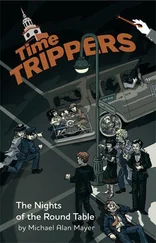“What about opening a bottle of that Crimean champagne?” asked Prévert.
“I’m all in favour,” said Liesowski. “After all, we have something to celebrate.”
Liebig seemed to welcome the distraction. He rose with alacrity and busied himself with the bottle, presenting his broad back and equally imposing posterior to Karpfen in the process.
The Commissioner pressed on doggedly. “I would ask you to remember that we—my comrades and the State we serve—have been compelled to rearm, even though our sole object has been to help defend the cause of peace. It has not escaped us that our action has aroused a certain sneaking distrust here and there. Moreover, gentlemen, there has always been a considerable degree of fellow-feeling between Poland and France.”
“I second that last remark,” said Prévert, unabashed.
“And I drink to it,” Liesowski chimed in.
“We cannot permit you,” Karpfen said heatedly, “to jeopardize the results of all our hard work and self-denial. I say this in all seriousness, gentlemen: we shall further the ends of justice, but not at the expense of a scandal. Our generals are not clay pigeons—as far as we’re concerned, they’re a necessity of life. I implore you to show some sympathy for our position.”
“I have remarkably little sympathy for murderers,” said Prévert, draining his glass, “but my appreciation of good food and drink is almost unlimited. All I can think of at the moment is that caviar over there.”
General Tanz entered the Hotel am Kurfürstendamm on the stroke of one o’clock. His slim, powerful frame was clad in a suit the colour of autumn leaves. His face might have been cast in bronze and his eyes seemed to be focussed on invisible armies deployed in the far distance.
He was met in the hotel foyer, predictably, by Wyzolla. The young man looked as though he was about to salute but controlled himself and came forward to make his report in a subdued voice. A suite had been duly reserved for Tanz and General von Seydlitz-Gabler was expecting him for lunch.
Tanz gave a suggestion of a nod. He did not seem to have changed much in the intervening years. The tanned skin covering bone and sinew, the sharply defined, pugnacious set of the jaw, the sea-blue sailor’s eyes, the mouth like a knife-wound—all looked the same. The grooves running from his nostrils, past the corners of his mouth, to his chin were deeper, but that was all.
Ignoring the chief receptionist, who bowed repeatedly, doubling up like a jack-knife, Tanz mounted the stairs leading to the first floor, accompanied by Wyzolla. He motioned to his escort to station himself outside the door and then entered von Seydlitz-Gabler’s suite.
The ensuing ceremony of welcome was positively affecting in its cordiality. The two men gazed into each other’s eyes, extended their arms and shook hands warmly and at great length.
“At last, at last!” breathed Frau Wilhelmine with well-rehearsed if slightly theatrical fervour.
“Just like old times, eh?” said von Seydlitz-Gabler as they sat down to table.
“The only one missing is our Ulrike.” Frau Wilhelmine never lost her grip of essentials. “The dear child will be along later. She’s a working girl, you know—extremely efficient, too, I’m told.”
“Well, my dear chap, how have things been with you since we last met?”
Tanz had been expecting this question and was ready for it. He regarded von Seydlitz-Gabler calmly, like a doctor meeting the gaze of an anxious patient.
“I did my duty.”
“It must have been very difficult for you sometimes,” hazarded Frau Wilhelmine.
“I ask you,” von Seydlitz-Gabler said jovially, “when was it ever easy to do one’s duty? Certainly not in times like these, I know that.”
While the floor waiter was serving lunch they chatted amicably about things in general, but Frau Wilhelmine soon steered the conversation back to Ulrike.
“All young girls try to kick over the traces occasionally, but she has never forgotten her duty towards us and the traditions of our family.”
“I have often thought of you, General,” Tanz said. “You and your family have always meant a great deal to me.”
Von Seydlitz-Gabler was touched and Frau Wilhelmine seemed equally moved. A mouth-watering aroma rose from the saddle of venison and red cabbage in front of them.
“It has always been part of a soldier’s job to make the best of any given situation,” Tanz went on, when the floor waiter had left the room. “Fate decreed that I should end up on the other side, but I was still in Germany.”
“Everyone appreciates that,” von Seydlitz-Gabler assured him, inserting a forkful of red cabbage into his mouth and following it up with a substantial helping of cranberries. “When you come down to it, my dear fellow, you’ve probably been going through the same sort of things we went through when the Bohemian corporal was in charge. They were difficult times but not inglorious ones. We stuck to our posts through thick and thin. Let’s face it—it was our legal duty to do so, if only to prevent something worse happening. If we’d been irresponsible enough to default, a pack of bloodthirsty and unscrupulous career-hounds would have stepped into our shoes.”
“I’ve been in much the same position myself during the past few years,” said Tanz. “My intentions have always been of the best. Whatever I’ve done, Germany has always been uppermost in my thoughts. After all, the people I’ve been dealing with over there are Germans too.”
“Absolutely,” agreed von Seydlitz-Gabler. “Magnificent material—you’ve only got to look at Sergeant Wyzolla to see that. Stout lad, Wyzolla. I gave him a careful once-over.”
“He’s only one of many. It was chaps like that who made me realize that I couldn’t evade my responsibilities. For all that, it’s become clear to me that if there are two Germanies one of them must be more—” he paused as if searching for the right word “—more worth-while than the other.”
“Bravo!” exclaimed von Seydlitz-Gabler, deeply moved. “A very creditable sentiment.”
Frau Wilhelmine said: “You can’t imagine how delighted we are to have you with us again. We’ve missed you.”
“You’re very kind,” Tanz replied. He grasped her hand and kissed it with a convincing display of chivalry. “If there were more people like you, dear lady, it would make everything very much easier. As things are, I fear there will be awkward misunderstandings.”
Von Seydlitz-Gabler leant back, savouring the blissful sensation of having lunched excellently in congenial company.
“You must realize, my dear friend,” he began importantly, “that the Federal Republic has gradually regained its respect for real values and its readiness to listen to men of long experience. The days of namby-pamby self-recrimination and mental confusion, the days when it was fashionable to foul one’s own doorstep—well, they’re gone for good. Just after the war they taught children to look askance at us. Young people were talked into pouring scorn on us. Even some of our old friends started to waver. But that’s all over now.”
“You can’t imagine how much we suffered,” put in Frau Wilhelmine, “though we kept a stiff upper lip, of course.”
“It was absolutely humiliating in the early days.” Von Seydlitz-Gabler bowed his grizzled head. “I’m ashamed when I think of the drivel published by German newspapers, of the muck written by German authors, of the filth spewed out by the German radio—buckets of it, I tell you! Still, let’s forget it. A lot of misguided individuals have realized their mistakes and mended their ways. Open our newspapers today—they’ve regained their character. Read a good book—authors are no longer ashamed of referring to our glorious past. Listen to our radio broadcasts—you won’t hear a word uttered against the forces of reconstruction and tradition.”
Читать дальше












